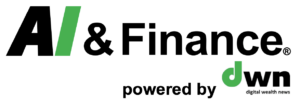Welcome to another AI & Finance headlines rundown, and we have a solid batch of artificial intelligence in financial services stories to cover for you.

This week we’d like to start by talking about Microsoft, which published its annual Work Trend Index about a week ago as of this writing in which the company polled more than 31,000 business leaders in 31 different countries, asking extensively about their company’s use of AI and their thoughts about artificial intelligence technologies in the future.
The headline numbers confirm much of what has already been reported—82% of the leaders in the survey believe AI is already revolutionizing the way their organizations work. The same proportion said that, within the next 12 to 18 months, they will use artificial intelligence as a type of digital labor to increase productivity.
Microsoft sees this as the first in a three-phase process that will see artificial intelligence integrated across the functions of individual businesses, sectors and the economy as a whole—and we’re already shifting to phase two, in which human workers and AI agents will work in tandem to render the traditional organizational work chart obsolete: much of the work that human managers and task-masters once passed off to other human beings can now be completed by autonomous agents. Rather than managing headcount, firms will evolve to managing a balance between the number of AI agents needed to complete the work, and the number of humans who will be needed to manage them.
Eventually, every employee in every company will be, in effect, a boss, according to Microsoft, but their underlings will be agentic artificial intelligence, not subordinate human beings. Microsoft deems this employee an “agent boss.” As a result, employers will shift towards hiring AI-literate workers with more generalist knowledge versus specialists focused on particular projects or tasks.
Most of the business leaders in Microsoft’s survey, 78%, said they were considering hiring for new artificial intelligence roles—only one-third, 33%, said they were considering headcount reductions.
Microsoft also identified a subset of “frontier firms” already moving into the third phase of its AI adoption framework. Within these firms, 71% of workers believe their company is thriving, versus just 37% for the entire Work Trend Index survey.
Other than providing a nice opportunity for Microsoft to market Copilot, the punchline here seems to be another opinion from a technology firm that artificial intelligence will at worst have a minor or zero-sum impact on employee headcount, and that for the working men and women of the country, AI is a gravy train waiting to happen/
I guess time will eventually tell, but excuse me if I’m still doubtful that AI’s impact on the future of work will be so utopian.
Let’s get to those headlines.
1. Acuity Knowledge Partners
Acuity Knowledge Partners (Acuity), a leading provider of bespoke technology, analytics, and research to the financial services sector, is excited to announce the launch of a market leading, deep domain specific Agentic AI platform – Agent Fleet for Banks, Asset Managers, and Private Equity houses.
Built solely to address the needs of the financial services industry, the Acuity Agent Fleet combines domain-trained Al agents with Acuity’s over 20 years of deep sector expertise and robust data infrastructure. This enables firms to scale their businesses, improve decision-making and efficiency-without expanding headcount. It reflects Acuity’s commitment to helping clients meet their challenges with smarter, faster, and more cost-effective solutions.
Acuity Agent Fleet, an Agentic AI platform, combines AI with no-code workflow automation. It consists of an Agentic Library which has a fleet of agents tailored for the financial services working together to perform tasks like data extraction to quantitative and qualitative analysis and publishing into Microsoft Office 365.
2. Bloomberg
From discovering that retrieval augmented generation (RAG)-based large language models (LLMs) are less “safe” to introducing an AI content risk taxonomy meeting the unique needs of GenAI systems in financial services, researchers across Bloomberg’s AI Engineering group, Data AI group, and CTO Office aim to help organizations deploy more trustworthy solutions. They have published two new academic papers that have significant implications for how organizations deploy GenAI systems more safely and responsibly, particularly in high-stakes domains like capital markets financial services.
In “RAG LLMs are Not Safer: A Safety Analysis of Retrieval-Augmented Generation for Large Language Models,” Bloomberg researchers found that RAG, a widely-used technique that integrates context from external data sources to enhance the accuracy of LLMs, can actually make models less “safe” and their outputs less reliable.
In a related paper, “Understanding and Mitigating Risks of Generative AI in Financial Services,” Bloomberg’s researchers examined how GenAI is being used in capital markets financial services and found that existing general purpose safety taxonomies and guardrail systems fail to account for domain-specific risks.
3. Feedzai
Feedzai, the global leader in fraud and financial crime prevention, today announced that it has acquired Demyst, including its Zonic data workflow orchestration platform, intellectual property, and sophisticated data-integration capabilities. This strategic move is part of Feedzai’s vision to unify data orchestration and risk management into a single platform, providing financial institutions with the real-time data, analytics, and trusted artificial intelligence they need to make the best possible risk decisions.
Together, Feedzai and Demyst deliver: A unified AI platform, a strengthened RiskOps lifecycle with enhanced account opening capabilities, contextual intelligence to combine identity, credit, network, financial history, behavioral insights, and others, better customer experiences with faster onboarding, improved risk insights by using the right data at the right time, and operational efficiency for non-technical teams.
4. Finhabits
Finhabits, the leading bilingual consumer fintech platform in the U.S., launches Emma, an AI-driven financial planner designed to empower investors with 24/7, bi-lingual and culturally-nuanced financial guidance. Built on eight years of proprietary data, Emma is designed to help investors develop better financial habits and long-term wealth.
Emma is more than a chatbot—it’s a bilingual financial planner that helps users manage paychecks, reduce debt, and invest with confidence. It also powers the Finhabits Financial Well-Being Score, based on CFPB standards, enabling Finhabits to build one of the largest datasets on financial wellness in underserved communities.
Emma will also support Finhabits’ expansion into insurance and loans, using scalable AI to guide users across key financial decisions.
5. Higginbotham
Higginbotham, identified through Business Insurance reporting as the largest independent insurance, financial and HR services firm headquartered in Texas, has teamed up with Construction Casualty Insurance (CCI) of St. Petersburg, Florida. In this meeting of risk management powerhouses, Higginbotham’s Day Two Services® and CCI’s CompCorrect® in-house AI platform will come together to proactively serve high-risk clients across the country.
Higginbotham Chairman and CEO Rusty Reid looks to the future with a platform of strategic growth, forming alliances with agencies that share the Fort Worth firm’s dedication to client and community service and staff support. With CCI, Reid has found a partner that shares those values — and also stands tall in the industry for an intense commitment to identifying and solving risk management issues for clients facing serious operational insecurity.
CompCorrect is CCI’s proprietary cloud-based risk management platform. Designed to go well beyond basic claims tracking, the software leverages artificial intelligence to assess hundreds of variables, generate automated communications across stakeholders, and apply state-specific legal and regulatory guidelines in an effort to reduce claim costs and improve outcomes. With powerful data capture, analysis and predictive capabilities, the system is also designed to help clients take a proactive approach to future risk — heading off emergencies before they happen.
6. Kaira Technologies
Kaira Technologies, a Quebec-based fintech specializing in digital financial coaching, announces a major milestone in its development with the entry of PEAK Capital Partners as a strategic shareholder. This funding will accelerate the company’s growth nationwide and position Kaira as a leading force in financial wellness across Canada.
In today’s challenging economic environment, the need for accessible financial guidance has never been greater. In 2025, more than 80% of Canadians still lack access financial planning, leaving them alone to navigate crucial financial decisions.
That’s exactly the issue Kaira Technologies, founded in 2018, is addressing. With an AI-powered digital platform, Kaira offers budget coaching and affordable, human financial planning — for employers, institutions and individuals.
7. Options Technology
Options Technology (Options), a leading provider of cloud-enabled managed services for global capital markets, today announced that it will be the first vendor to deliver OTC Markets’ MOON ATS™ and OTC Overnight market data, via its industry-leading AtlasFeed.
This will enhance Options’ market data offerings, providing traders with unparalleled access to overnight liquidity and global market coverage. It also represents a key milestone in OTC Markets’ ongoing efforts to expand its innovative platforms, offering a 24/5 trading model tailored to meet the needs of global investors seeking more flexible trading opportunities.
By leveraging Options’ AtlasFeed, market participants will benefit from low-latency, normalized data that ensures real-time pricing and liquidity insights, irrespective of time zone.
8. Patra
Patra, a leading provider of technology-enabled insurance outsourcing services and AI-powered software solutions, today announced significant enhancements to its Patra AI platform. The platform now offers expanded workstream flexibility through improved service options for Policy Checking AI and Quote Compare AI, enabling insurance organizations to dynamically adjust workflows, resources, and processes in response to changing priorities, market conditions, or disruptions.
Workstream flexibility represents a critical capability for modern insurance organizations, allowing them to select the optimal combination of technology and human expertise for each specific situation. Patra offers workstream flexibility for its Policy Checking AI solutions ranging from fully automated AI-only review to customized white-glove service with human oversight, and its Quote Compare AI solutions offering similar adaptability from straight-through AI processing to comprehensive human-in-the-loop review.
Patra’s Quote Compare AI now offers three distinct solution options to automatically extract, analyze, and provide insurance quote comparisons from multiple carriers.
9. Sherpas
Sherpas, an AI-native platform for financial advisors, today announced its public launch after operating in stealth. Founded by fintech leaders from LPL Financial and AllFunds, Sherpas is building the infrastructure layer for modern hybrid financial advice—where AI handles the heavy lifting, and human advisors bring the trust and expertise.
The platform automates the most time-consuming parts of the advisory workflow—turning financial data into personalized planning recommendations in minutes instead of hours. This allows advisors to scale advice delivery without sacrificing personalization or client connection.
Sherpas uses AI to automate the entire planning workflow—analyzing financial data, surfacing insights, and generating personalized proposals in real time. This automation cuts up to 80% of the work it takes to convert a prospect into a client—unlocking the ability to serve more households, including those that were previously too time- or cost-intensive to support.
10. Talkdesk AI
Talkdesk®, Inc., a global provider of artificial intelligence (AI)-powered customer experience (CX) technology that serves enterprises of all sizes, today announced a new agentic AI solution—part of the Talkdesk Ascend AI™ platform—purpose-designed for banks and credit unions to deliver high-value, personalized service across the entire customer journey. Unlike one-size-fits-all agentic AI offerings, Talkdesk AI Agents for Financial Services is an out-of-the-box solution built on industry-specific AI models with deep integration into core banking, digital banking, and customer relationship management (CRM) platforms—making it easier for financial services institutions to implement a new level of customer experience automation that delivers real value. Talkdesk AI Agents for Financial Services can automate many of the most important and frequent customer and member inquiries, freeing human agent time to deal with more complex and critical issues.
Using agentic AI, Talkdesk AI Agents for Financial Services enables sophisticated conversational experiences that understand context, express empathy, autonomously analyze situations, make informed decisions, and take action to resolve requests—while putting consumers at ease, keeping them engaged, and making them feel valued throughout the self-service process.
Talkdesk AI Agents for Financial Services enables organizations to take their CX automation and digital strategies much further while providing the robust guardrails banks and credit unions need to remain compliant. With agentic AI, consumers get 24/7 on-demand access to automated conversational agents to handle everyday tasks such as managing their deposits, servicing their loans, managing their cards, and scheduling appointments with financial advisors. Unlike traditional intent-based virtual agents that rely on rigid, pre-scripted answers to address common customer questions, Talkdesk AI Agents for Financial Services easily adapts to customers’ language, tone, and preferred communication channels, showing empathy when needed (e.g., demonstrating empathy about a fraud concern or excitement about a new credit card offer) and giving customers much better control of their financial lives.
11. WitnessAI
WitnessAI, creator of the first enablement platform for safe AI use, and a finalist for the SC Awards for Best Compliance Solution, today announced the release of WitnessAI 2.0, offering five key updates for organizations looking to remain compliant with regulations such as the Payment Card Industry Data Security Standard (PCI DSS) while adopting enterprise AI tools.
The PCI Security Standards Council recently released guidelines for ‘Integrating Artificial Intelligence in PCI Assessments,’ demonstrating growing recognition of AI’s role in payment security ecosystems. Under PCI DSS 4.0.1, organizations must carefully scope and secure all systems that ‘could impact the security of the CDE’ (Cardholder Data Environment) – a criterion that implicitly includes AI tools with access to sensitive environments. WitnessAI provides the visibility, control, and protection needed to ensure that these AI interactions comply with PCI requirements, helping organizations maintain regulatory compliance while safely leveraging AI capabilities.
WitnessAI is designed to address unique and ongoing compliance challenges of AI in regulated environments, offering a platform that will evolve with AI regulations as they emerge. The WitnessAI Secure AI Enablement Platform was recognized as a 2025 SC Awards finalist in the “Best Compliance Solution” category, showing a proven dedication to helping businesses navigate the intersection between AI innovation and compliance.








